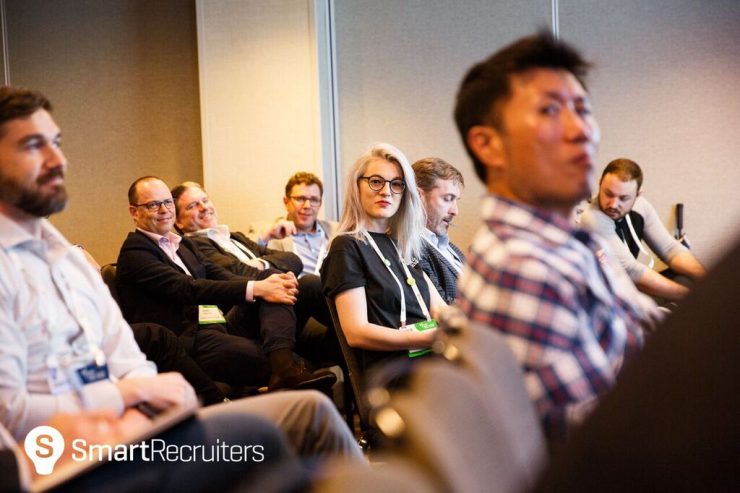Find out what un-conferences are all about, as SmartRecruiters’ head of DACH sales development navigates one for the first time.
First off, let me explain the concept. An “un-conference” is not quite the opposite of a conference, it’s more like a free-spirited sibling. In both instances you go to learn, it’s just two different ways of going about it. Un-conferences are typically intimate gatherings which ask a lot of the attendees in terms of engagement – one does not attend an un-conference, one participates.
I arrived at HR Bar Camp a bundle of nerves, as I knew the first activity of the day would be picking our schedule. And not just selecting sessions. Participants would be creating our agenda in a whirlwind pitching session.
Nine am and 200 eager participants are ready to get started. After a quick introduction from our hosts Jannis Tsalikis, VP of HR for VICE DACH, and Christoph Athanas, managing director and senior consultant at Meta HR management consultancy GmbH, the pitching begins and anyone who has something they want to share, or burning HR questions they want to discuss can stand up, give their spiel, and hope their suggestion gets picked as one of the day’s sessions.
Being my first unconference, I figure I should go all in. Why miss an opportunity for an intriguing conversation? I juggle a few ideas around CRM, job-matching, chatbots… but after a few minutes I know it has to be recruiting AI. We HR people are still trying to get our heads around this new reality that, until recently, seemed like science fiction, so I knew people would have a lot of questions: Will I be replaced by a machine? Will AI help root out unconscious bias?
The timing couldn’t be better actually. See, SmartRecruiters recently announced the first native AI Recruiting Assistant, and this new capability helps discover candidates and checks bias while saving recruiters time. I teamed up with my colleague Camila, and 30 minutes later we were throwing our names into the ring as potential session leaders. Ours was chosen and we rushed to prepare for what turned out to be a full house.
There is a lot to cover and only an hour to cram in all this information, so we begin with one of the topic’s basic premises: candidate selection. How does the process actually work in most organizations? Research shows that recruiters spend an average of six seconds looking at a resume and it makes you wonder – How many well-earned call-backs never happen? How many good resumes are lost among stacks of paper?
Most of our participants agree that six seconds is not enough time to make an informed decision on an applicant. Some even wonder if it’s worth it to look at resumes at all, as long as they can’t take the proper amount of time with each one. But that leads us back to the problem of volume. There’s no way to take five minutes with each application when you receive 300 for every opening.
Of course, there’s matching technology, “but didn’t we try that already?” a participant accurately points out, which is how the conversation proceeds to the difference between keyword matching and AI. In the former, if a resume lacks a certain vocabulary, or “keywords”, the system fails to identify a match. While the latter technology uses an algorithm based on clustering concepts to imply skills that aren’t mentioned explicitly.
Most of our group works in large companies and receive hundreds of applications daily so this solution really speaks to them, the general consensus being that an AI assistant surfacing relevant applications will enable the recruiter to spend more time on other parts of their job, like working with hiring managers or expanding their networks.
Our conversation about finding the best candidates incorporates two sources routinely overlooked, though they are perhaps the best resource for finding qualified people who are interested in your company already: internal candidates and former applicants. A native AI assistant on your applicant tracking system will assure those valuable prospects don’t get overlooked. Another great thing about recruiting AI is that it cuts way down on bias, inherent or unintentional, by providing a list of qualified candidates without the judgments that are likely to creep in with only a six-second screening.
Looking back, did we end up answering all the questions about recruiting AI? To tell the truth, we probably only created more. And that was my biggest takeaway about unconferences: it’s all about asking questions, and by asking questions, you start new conversations.











